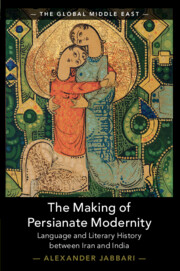
-
Select format
-
- Publisher:
- Cambridge University Press
- Publication date:
- March 2023
- March 2023
- ISBN:
- 9781009320825
- 9781009320863
- 9781009320818
- Dimensions:
- (229 x 152 mm)
- Weight & Pages:
- 0.554kg, 266 Pages
- Dimensions:
- (229 x 152 mm)
- Weight & Pages:
- 0.389kg, 266 Pages
- Subjects:
- Middle East Studies, Area Studies, South Asian History, Asian Studies, History, Middle East History
- Series:
- The Global Middle East (25)
You may already have access via personal or institutional login- Subjects:
- Middle East Studies, Area Studies, South Asian History, Asian Studies, History, Middle East History
- Series:
- The Global Middle East (25)
Book description
From the ninth to the nineteenth centuries, Persian was the pre-eminent language of learning far beyond Iran, stretching from the Balkans to China. In this book, Alexander Jabbari explores what became of this vast Persian literary heritage in the nineteenth and twentieth centuries in Iran and South Asia, as nationalism took hold and the Persianate world fractured into nation-states. He shows how Iranians and South Asians drew from their shared past to produce a 'Persianate modernity', and create a modern genre, literary history. Drawing from both Persian and Urdu sources, Jabbari reveals the important role that South Asian Muslims played in developing Iranian intellectual and literary trends. Highlighting cultural exchange in the region, and the agency of Asian modernizers, Jabbari charts a new way forward for area studies and opens exciting possibilities for thinking about language and literature.
Reviews
‘In an engaging and accessible, yet analytically exact style, Jabbari explores crucial shifts in the development of literary history, revealing changing conceptions of social collective, history, and sexuality in the age of print nationalism. At the heart of this untold story is the tension between a transregional endeavor to fashion modern concepts and texts out of the Persianate past, while also claiming unique, divergent national contexts.'
Mana Kia - Columbia University
‘An important contribution to both Middle East and South Asian Studies. Alexander Jabbari brings a wealth of new source material and very original readings to document the surprising afterlives of the Persianate cultural system. This book challenges many of the stubborn conventions of both nationalist historiography and the area studies paradigm.'
Afshin Marashi - University of Oklahoma
‘In this erudite study of the disjuncture between the Persianate past and modern nationalist histories of literature, Jabbari deftly weaves a fascinating narrative of the role that textual genres, (homo)eroticism, linguistic history, orthography and punctuation played in the making of Persian literary modernity.'
Sunil Sharma - Boston University
‘Written with depth and precision, Alexander Jabbari demonstrates how engagements between Persian and Urdu were crucial to the creation of a new habitus of literary modernity in twentieth-century Iran and South Asia, making the case that the story of literary culture in the era of nations may best be told from a transregional and multilingual perspective.'
Kevin L. Schwartz - Oriental Institute, Czech Academy of Sciences
Contents
Metrics
Altmetric attention score
Full text views
Full text views help Loading metrics...
Loading metrics...
* Views captured on Cambridge Core between #date#. This data will be updated every 24 hours.
Usage data cannot currently be displayed.
Accessibility standard: Unknown
Why this information is here
This section outlines the accessibility features of this content - including support for screen readers, full keyboard navigation and high-contrast display options. This may not be relevant for you.
Accessibility Information
Accessibility compliance for the PDF of this book is currently unknown and may be updated in the future.


